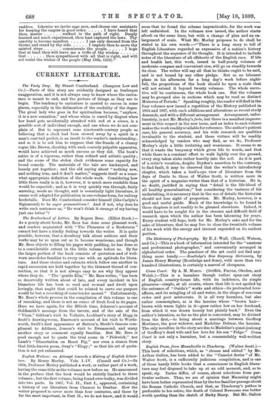Crane Court. By A. M. Monro. (Griffith, Farmn, Okeden, and
Welsh.)—This is a harmless though rather spun-out story of English country-house life, with its indolence, its simple pleasures—simple, at all events, where that life is not spoiled by the entrance of " Ouida's " works and ethics—its protracted love- affairs, and its mingling of oil and water, in the shape of nouveaux riches and poor aristocrats. It is all very harmless, but also rather commonplace, as is the heroine whose "brown hair— brown with warm lights in it—grew rather low on her forehead, from which it was drawn loosely but plainly back." Even the author's intention, so far as the plot is concerned, may be divined from the first,—to bring about a marriage between Geoffrey Mortimer, the poor widower, and Madeline Delmar, the heroine. The only novelties in the story are due to Madeline's quasi-jealousy of Geoffrey's dead wife and her love for his son " Fidge." Crane Court is not only a harmless, but a commendably well-written story.


































 Previous page
Previous page